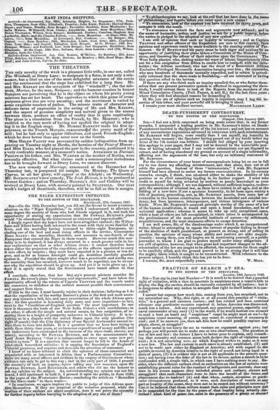DEATH-PUNISHMENT CONTROVERSY.
TO THE EDITOR OF THE SPECTATOR.
Glasgow, 24th January 1842.
SIR-1 feel not a little concerned on being made aware that, in my former remarks, I misquoted a leading position in Mr. SAMPSON'S letter on Death- Punishment inserted in theSpectator of the 1st instant; and not less on account of any uncourteous expressions advanced in- connexion with such misstatement, Mr. SAMPSON Will forgive, more readily than I can myself, my temerity in quoting from memory ; the Spectator having passed out of my hands before my letter of the 7th instant was written. I should feel obliged by your inserting this apology in your pages, that I may not be doomed to the unenviable posi- tion of having advanced what I can neither substantiate nor am disposed to retract, and of having abandoned my ground on account of a single informality, affecting not the arguments of the Case, but only an initiatory statement of Mr. SAMPSON.
For the circumstance of your brace of correspondents being let on main full cry to run down my offending misstatement, and that alone, does not at all settle the question. Instead of these " intrusionists," I wish Mr. SAMPSON himself had been allowed to notice my former communication. In its cursory remarks, enough, I think, was advanced either to shake the stability of his position or to elicit something tending to its further support. I must take credit to myself for being actuated by motives as purely benevolent as your correspondents; although I am not disposed, without sufficient inquiry, to abro- gate the sanctions of criminal law, as these have existed in all ages, and at the bidding of a new-born if not a spurious humanity, to let loose upon society a tide oiyassions, proceeding, not, AS Mr. SAMPSON asserts, from some law of connexion in the human constitution between the homicidal and suicidal ten- dency, but from ignorance, intemperance, and vicious indulgence of various kinds. Were Mr. SAMPSON'S assumed principle worthy of the name of a law of the human constitution, it would rest upon a broad foundation, and be of universal application ; whereas it seems to take up only exceptional cases,
i
while a host of others are left unexplained, in which crime s accompanied by the predominance of the most powerful instincts of nature—by selfishness, acquisitiveness, and the most strenuous efforts to escape detection. I am well aware, Sir, of the disadvantage under which I, an inexperienced writer, labour in attempting to oppose the current of popular feeling in favour of the abolition of death punishment, at present so strong, and of calling in question the opinions of many whose ability and motives are alike unques- tionable: among these, you will forgive me in mentioning yourself, as a public journalist to whom I am glad to profess myself under many obligations. I am still of opinion, however, that when great and important changes in the ad- ministration of the law are sought to be effected, the arguments for them ought to be carefully sifted, and the ground proved to be so strong that it will bear the mighty fabric which is sought to be reconstructed. With reference to the present subject, I humbly think this has yet to be done.
I remain, Sir, most respectfully yours, W. MILL.


























 Previous page
Previous page